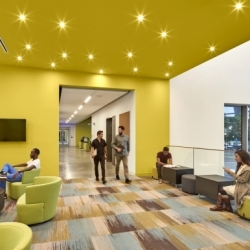
Andrew Doba of the rival East Hartford casino group called the HHC casino symposium a “publicity stunt”.
A recent single-day symposium at Housatonic Community College was used to promote MGM Resorts’s long-debated casino development plan for a Bridgeport casino. According to the CT Post, the daylong event was “largely” paid for by MGM Resorts.
At the moment, a Bridgeport casino is still very much a theoretical proposal. Yet after several years of talk, there have been signs in recent months that such MGM Resorts’ plans have a chance at succeeding.
Last month, state lawmakers introduced a bill to the Connecticut state legislature which would form a “competitive bidding process” for a Bridgeport casino. The bill also would create a Connecticut Gaming Commission to oversee the process.
The bill, which is supported by the so-called Bridgeport delegation of lawmakers, does not specifically mention Bridgeport. Instead, the bill states the delegation wants to foster a “competitive bidding process for a resort-casino that would allow the state to choose a development with the most economic impact to the state.”
Bridgeport Delegation Supports Casino
Those who submitted the bill believe Bridgeport would be the casino site which would have “the most economic impact on the state.” That is because Bridgeport is only 65 miles down I-95 from New York City.
In the thinking of the Bridgeport casino bill’s proponents, building a casino in the verge of New York City would allow the site to build a customer base of New Yorkers. Bridgeport is less than half the distance that it is to Uncasville or Ledyard, where Mohegan Sun and Foxwoods are, respectively.
Of course, casino sites near New York City have a variety of drawbacks for the locals. The HCC symposium had several panels and keynote speeches to discuss the pros and cons. Advantages included job creation and entertainment opportunities in the Bridgeport area.
Keri Pyke on Solving Traffic Congestion
Disadvantages focused on traffic and public safety, which are closely interwined. Traffic congestion is a huge issue on I-95 as it approaches New York City, which has a population of 20 million+ people in the greater metropolitan area. Building a casino in Bridgeport would cause more roadway congestion, at least if the developers and city planners did not take contingencies.
Keri Pyke, who works at Boston’s Howard Stein Hudson in mass transportion planning, was at the symposium. Pyke has consulted with MGM Springfield and Encore Boston Harbor construction management plans, so she is an expert on traffic congestion caused by casinos.
Pyke said alternative transit methods would have to be devised, “I think the biggest thing is that, especially on the regional roadways, they are already congested…but I also think there are ways to deal with that….“If we could run a shuttle from the property to connect to the bus terminal and train terminal and the ferry, then you can get people out of their cars and give them other ways to get to the site.”
Jason Rucker on the Cost of Public Safety
Jason Rucker, MGM Springfield’s executive director of security, was on a panel to discuss public safety issues. Many residents had concerns about the number of police officers who would have to be diverted to protecting the vicinity of the casino, due to increased crime rates near such a destination.
Those same residents wanted to know who would foot the bill for a diversion of such resources — the taxpayers or the casino operators. Mr. Rucker said he could not name a cost without studying the problem further, but said, “The population is a huge piece of it — the arteries in and out and around. We (in Springfield) are literally downtown within walking distance of umpteen things…we’re very porous on all sides because we are in the middle of a downtown.”
Andrew Doba: HHC Symposium a “Publicity Stunt”
Not everyone was in attendance. Though a spokesman for the Connecticut tribes acknowledged that MGM Resorts and HHC had extended an invitation for the tribes’ experts to attend, they declined the invitation.
Andrew Doba, a spokesman for Mohegan Sun’s and Foxwoods’s joint venture in East Windsor, terms the symposium a “publicity stunt.” When asked why the two tribes did not attent the event, Doba said, “Opponents don’t generally take part in each other’s publicity stunts, and that’s exactly what this was.”
